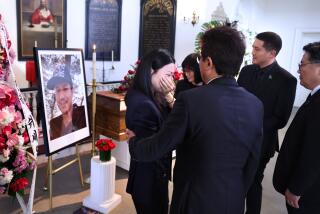World Cinema: Korean actress Yun Jung-hee makes poetic return to acting
- Share via
For nearly three decades, Yun Jung-hee was one of the brightest lights in Korean cinema. She made her feature debut in 1967’s “Sorrowful Youth,” then went on to appear in nearly 300 films, amassing a reputation as possibly the greatest actress in the nation’s history.
Since she announced her retirement in 1994 after completing the film “Two Flags” — Yun married pianist Kun-woo Paik and together they raised a daughter in Paris — cinéastes have been clamoring for her return. Yun, now 66, concedes that she too was perhaps just waiting for the right role. “I had many offers from different directors, television dramas and plays, but I was waiting for something special,” she said by email.
Two years ago she found that something special in the drama “Poetry,” written and directed by Lee Chang-dong (“Secret Sunshine”). “Poetry” won the best screenplay honors last year at Cannes Film Festival and opened this month in limited release in Los Angeles.
Yun plays Mija, a widow who works part time as a maid and caretaker for an elderly stroke victim and is raising her teenage grandson. Mija discovers she is in the early stages of Alzheimer’s disease around the same time the boy commits a terrible crime against a classmate, and to cope with her diagnosis and the horrible nature of her grandson’s actions, Mija enrolls in a poetry class.
Reviews for the film and especially for Yun’s performance have been glowing. “Poetry” scored a 100% “fresh” on rottentomatoes.com.
The Times’ Kenneth Turan described Yun’s performance as one “of surpassing delicacy. The nuanced emotional range she displays as the film’s situations peel layers off her personality and turn her into a different person is almost beyond the power of words to convey.”
Via a translator, Lee said he had Yun in mind for Mija even before he began to write the script.
“I have always liked her from very early on when I was a teenager,” said the 56-year-old filmmaker. “She was like a legendary film star in Korea, so she was almost not of this world because of her success at the time. It was completely unimaginable to me that I would be working with her sometime later on.”
Lee, said Yun, invited her to dinner one evening to discuss the project while she was visiting Seoul. “He told me he had been writing a new scenario for months and that to continue to write without telling me bothered him — he had to let me know,” said Yun. “I accepted without asking what it was about. I had seen all of his works and read his novels. I believed in him and was very eager to work with him.”
After meeting Yun, Lee imbued Mija with many of the actress’ traits. “Before I worked on the film, I didn’t really know her privately, but when was I writing the script I was more and more convinced her inner world would be very similar to that of the main character,” he said.
Yun agrees that Mija is very much a kindred spirit. “Like her, I am a daydreamer,” she said. “I love flowers and nature moves me. I played my own personality naturally. He insisted on it.”
Lee said he took more care with Yun on the set than the other actors because her character carries the film. “Also physically it was very challenging for her,” he said. “It was a tough job to carry out. What was interesting was compared to her younger compatriots, she was a lot more open-minded, a lot more open to my different ideas.”
Returning to acting after such a long absence wasn’t difficult for Yun — “It was like going back home,” she said — and she had nothing but praise for Lee. “Every corner of the screen is thought out and controlled. He’s a very inspiring director.”
Yun described the beginning of her career 44 years ago as “a little short of a miracle. By suggestion of my friends, I participated in an audition and was chosen to play the principal role of a very important film. The big success of my very first film led to many wonderful films with our best directors of the time. As an actress … we mirror life itself until we die. My life and my life in cinema are one.”
More to Read
The biggest entertainment stories
Get our big stories about Hollywood, film, television, music, arts, culture and more right in your inbox as soon as they publish.
You may occasionally receive promotional content from the Los Angeles Times.











